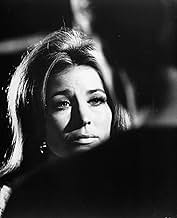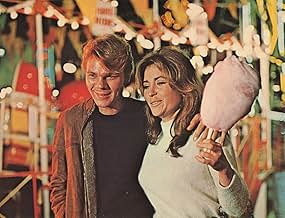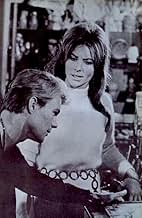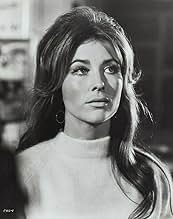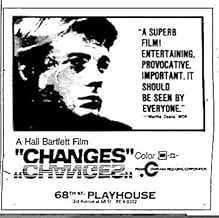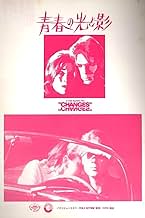A young man, Kent Lane, who is distraught after his childhood sweetheart, Manuela Thiess, commits suicide, goes in search of himself. He gets involved with woman, Michelle Carey, who teaches... Read allA young man, Kent Lane, who is distraught after his childhood sweetheart, Manuela Thiess, commits suicide, goes in search of himself. He gets involved with woman, Michelle Carey, who teaches him lessons about life.A young man, Kent Lane, who is distraught after his childhood sweetheart, Manuela Thiess, commits suicide, goes in search of himself. He gets involved with woman, Michelle Carey, who teaches him lessons about life.
- Director
- Writers
- Stars
Tom Holland
- Roommate
- (as Tom Fielding)
- Director
- Writers
- All cast & crew
- Production, box office & more at IMDbPro
Featured reviews
This long forgotten coming of age drama was briefly available on VHS from Prism and is now almost impossible to find. Produced, written, and directed by Hall Bartlett, Changes treads some familiar territory, but does so delicately and in interesting ways. The film features very little dialogue, with the songs of Tim Buckley dominating the soundtrack, which also features Judy Collins' pop version of Both Sides Now. Prism's tape looks great, but is sadly pan and scanned, leaving Richard Moore's gorgeous Panavision photography in less than optimal condition. Nonetheless, this is well worth a look, especially for those with a particular interest in the era, or for those who attended the Berkeley campus, where early scenes were shot. Get a look at how the Campanile, Sather Gate, and Lower Sproul looked in the late 60s! They haven't changed much since then...
While there's a lot about this film I can criticize; the low budget limitations, the badly dubbed dialogue (sections, not all through), and some pretentious, badly dated elements, it's one of the more interesting, beguiling films about being young and a sort-of rebel in the 60s I've seen.
More poetic than plot driven, with a minimum of dialogue, a young man goes on the road to find himself, and to forget a girlfriend who killed herself when he couldn't commit. He sees the country and has a fairly complex romance with a sexy southern woman a little older than himself.
A quiet, thoughtful film, with great songs (mostly by Tim Buckley). I kept wanting to dismiss this, but found I couldn't. Reviews from the time (a rave in The New York Times), talk about how great the widescreen photography is. Sadly, its only available on a murky 4:3 VHS transfer, and even that is very hard to find.
More poetic than plot driven, with a minimum of dialogue, a young man goes on the road to find himself, and to forget a girlfriend who killed herself when he couldn't commit. He sees the country and has a fairly complex romance with a sexy southern woman a little older than himself.
A quiet, thoughtful film, with great songs (mostly by Tim Buckley). I kept wanting to dismiss this, but found I couldn't. Reviews from the time (a rave in The New York Times), talk about how great the widescreen photography is. Sadly, its only available on a murky 4:3 VHS transfer, and even that is very hard to find.
Finally saw this very hard-to-find counterculture film, albeit in a version that presumably for reasons of music rights difficulties had several soundtrack passages muted. (The Tim Buckley songs were intact, though, as well as a couple atrocious new songs by the original score composers.) It was letterboxed, which was great because as with Bartlett's best-known film, the rather notorious flop "Jonathan Livingston Seagull," "Changes" is very strong on slick visuals. Storywise, it's not so strong, although why this movie went nowhere while "Easy Rider" became a phenomenon the same year is an open question. Maybe that film's obvious "rebels" more fit a youth audience's image of themselves at the time, while the vaguely disgruntled, clean-cut, middle-class hero here was a figure a little too close to their reality. Neither film has aged all that well, but they're both time capsules.
Kent Lane is the college student who drops out because...well, because he wants something, and...well, he doesn't know what it is, but...well it's definitely not going that whole square degree-to-job-to-cult-de-sac route. This upsets his parents (who as usual in movies of this time seem to be way too old to have a child of his generation), but oh well. So he goes off to "see America," first stopping at his friend Sammy's (Bill Kelly) racetrack and hippie commune-type place, soon crashing his own car, then hitching a ride with a sort of roving youth reporter (Marcia Strassman), then falling in with a mercurial Southern beauty (Michele Carey), at which point the movie bogs down somewhat in conventional romantic histrionics between two characters who are demanding and petulant but resistant to being tied down. Our hero is also on the run from the memory of an ex-girlfriend who killed herself, it seems, I wasn't quite clear why.
There's not much in the way of plot here--"Changes" more wants to catch a questioning mood common at the time among youth, one that now feels pretty trite and cliched. You know, the old "I don't know what I want! I just don't want what my parents want for me! That's a drag!" There isn't a lot of dialogue (until the bogged-down later going), and the little that there is tends to reinforce that there's not much deep thinking going on there. It's one thing for our hero to constantly be photographed in nice settings looking "thoughtful," but the movie never conveys that there's anything interesting or surprising on his mind. (Kent Lane is OK, but he doesn't provide much personality or charisma to fill in that blank, so you can see why his career didn't get much further.) On the plus side, that photography really is fine, and it eschews nearly all of the gimmicks then trendy in films (like zoom lensing). There are a lot of pleasant montages to music that are often from Tim Buckley's "Goodbye and Hello" LP, a record that has only improved with age. But some songs by other artists (including Judy Collins and Neil Young) were silenced on the print I saw, creating long stretches of empty audio.
All in all, a technically very well-crafted if not particularly resonant memento from the era that I'm glad to have finally seen...even if it proved no lost classic. Among familiar faces glimpsed in bit parts, Teri Garr gets a bit as a waitress, with the sole line "Burger!!" I suspect a lot of actors here shot dialogue that was eventually cut as the film leaned more and more towards musical montage in the editing room.
Kent Lane is the college student who drops out because...well, because he wants something, and...well, he doesn't know what it is, but...well it's definitely not going that whole square degree-to-job-to-cult-de-sac route. This upsets his parents (who as usual in movies of this time seem to be way too old to have a child of his generation), but oh well. So he goes off to "see America," first stopping at his friend Sammy's (Bill Kelly) racetrack and hippie commune-type place, soon crashing his own car, then hitching a ride with a sort of roving youth reporter (Marcia Strassman), then falling in with a mercurial Southern beauty (Michele Carey), at which point the movie bogs down somewhat in conventional romantic histrionics between two characters who are demanding and petulant but resistant to being tied down. Our hero is also on the run from the memory of an ex-girlfriend who killed herself, it seems, I wasn't quite clear why.
There's not much in the way of plot here--"Changes" more wants to catch a questioning mood common at the time among youth, one that now feels pretty trite and cliched. You know, the old "I don't know what I want! I just don't want what my parents want for me! That's a drag!" There isn't a lot of dialogue (until the bogged-down later going), and the little that there is tends to reinforce that there's not much deep thinking going on there. It's one thing for our hero to constantly be photographed in nice settings looking "thoughtful," but the movie never conveys that there's anything interesting or surprising on his mind. (Kent Lane is OK, but he doesn't provide much personality or charisma to fill in that blank, so you can see why his career didn't get much further.) On the plus side, that photography really is fine, and it eschews nearly all of the gimmicks then trendy in films (like zoom lensing). There are a lot of pleasant montages to music that are often from Tim Buckley's "Goodbye and Hello" LP, a record that has only improved with age. But some songs by other artists (including Judy Collins and Neil Young) were silenced on the print I saw, creating long stretches of empty audio.
All in all, a technically very well-crafted if not particularly resonant memento from the era that I'm glad to have finally seen...even if it proved no lost classic. Among familiar faces glimpsed in bit parts, Teri Garr gets a bit as a waitress, with the sole line "Burger!!" I suspect a lot of actors here shot dialogue that was eventually cut as the film leaned more and more towards musical montage in the editing room.
An excellent movie about a young man who wants to find himself, very 60ies-like and good photographed. The music is also fantastic. Most of the songs come from Tim Buckley and his album Goodbye und Hello. This is one of my all-time favourite movies, an independent production from director Hall Bartlett, who later become famous with the movie Jonathan Livingston Seagual. If you love the 60ies and want to understand the feeling of this time don't miss it!
College kid in Northern California (attending Berkeley, though it's never specified) "drops out", apparently after the suicide of a female friend (she appears to drown herself in the Pacific Ocean near Big Sur, though this isn't specified either). Documentary filmmaker and screenwriter Hall Bartlett (Oscar-nominated in 1953 for "Navajo") directed and co-wrote this feature which plays like a documentary in search of a subject. Cinematographer Richard Moore gets some lovely shots of Big Sur and Monterey, while the music (largely songs by singer-songwriter Tim Buckley) is appropriately full of angst and melancholy. Our protagonist takes to the highway after an argument with his father--played by Jack Albertson, in the film's only strong scene--but, for reasons unexplained, he wrecks his beautiful car (a black 1956 Porsche Speedster) and begins hitchhiking. Kent Lane has the lead; he's not supposed to be a rebel or rabble-rouser, but instead just an ordinary kid with troubling thoughts he mainly keeps to himself (he blows a job interview after asking the boss if he believes in past lives). Lane has a handsome, angry look that resembles Gary Lockwood's, but he has very little charisma and isn't encouraged to show us any depth. Bartlett uses Lane as a camera subject, putting him in front of sunsets and a Ferris wheel; there's nothing wrong with that in the visual sense...but when the filmmaker runs out of calendar art, the movie's over. There isn't an overt political statement being made here, at least not that I picked up on; we hear battle noise as Lane walks through what looks to be a veterans' cemetery--and the end-credits are scored with bits of speeches from Hitler to Kennedy to Martin Luther King--so what exactly are the "Changes" in the title? If it's a generation-gap thing, that point is made within the first 10mns. The rest of the film exists to evoke freedom, or the search for freedom, without the need to have money or make money. However, when Lane goes to a fair to eat a burger and play arcade games, he doesn't cry poor. *1/2 from ****
Did you know
- TriviaMarcia Strassman's debut,
- ConnectionsFeatured in The Naked Eye: Sex and the Mondo Film (2023)
- SoundtracksBoth Sides Now
Written by Joni Mitchell
Performed by Judy Collins
Courtesy of Siquomb Publishing Company and Elektra Records
- How long is Changes?Powered by Alexa
Details
- Runtime
- 1h 33m(93 min)
- Color
- Aspect ratio
- 2.35 : 1
Contribute to this page
Suggest an edit or add missing content


